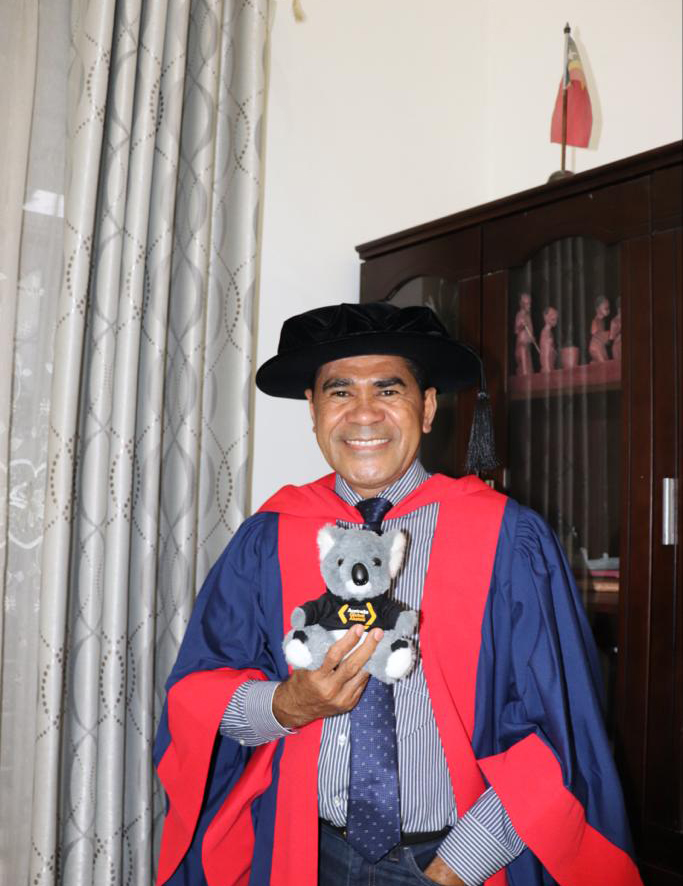
A pragmatic academic and practitioner with more than 25 years’ experience in leading health administrative systems, Dr Lourenço Camnahas (BHlthSc ’02, MHlthAdmin ’08, PhD ’20) has built his career around the needs of his country – which have changed and evolved dramatically since the height of Timor-Leste’s struggle for independence from Indonesia, which led to the UN resolution in 1999 and the creation of a new sovereign state in May 2002.
Dr Camnahas and his late wife, who sadly passed away while on holiday in Melbourne in 2019, had been involved with the movement from the beginning after first meeting while studying nursing in Makassar, Celebes (now Sulawesi, Indonesia).
“I started nursing, but it was not for me,” said Dr Camnahas.
“I then moved to public health but didn’t finish my degree before the Timor struggles brought me back.”
Dr Camnahas knew what a huge task lied ahead in rebuilding a country’s healthcare system. While foreign aid can support primary care, his vision has always been to develop management, processes and governance to make sure health is sustainable and locals can become independent managers of their healthcare in partnership with others.
“It really was clandestine involvement to begin with, I was focused on planning with a team in our health sector called Group 9 – providing medical aid support while the movement grew,” Dr Camnahas said.
Towards 1999, this work intensified.
“After independence was declared, I became a national official for UNICEF and appointed a local consultant in Timor-Leste.”
Keen to restart his learning journey and acquire the skills needed to give Timor-Leste’s health system the best chance of succeeding, Dr Camnahas successfully applied for and won an Australia Awards scholarship.
“I originally planned to go to QUT (Queensland University of Technology), but first went to Wollongong in 2001 for English lessons,” he explained.
“While there, I ended up attending Adelaide for an international public health conference, just by chance, for three days as a representative for Timor-Leste’s Vice-Minister for Health who could not make it.
“We were taken around all three South Australian unis and I fell in love with the location of Flinders, so although I’d already nominated QUT, I asked to change!
“I was the first Timor-Leste student to go to Flinders Uni.”
After completing his Bachelor of Health Sciences in 2005, Dr Camnahas returned to Timor-Leste with the knowledge he had been seeking to begin establishing the health sector, including the training of much needed health workers in priority sectors.
“My role was within the National Agency of Health Sciences in Timor-Leste,” he said.
“I led nursing, midwifery and allied health programs which were also backed by WHO, the UN, UNICEF and a number of other NGOs.”
In 2008, Dr Camnahas wanted to specialise his skillset, choosing his academic pathway with his country’s clear developmental goals in mind, by returning to Adelaide and undertaking his Master of Health Services Management (Health Administration) at Flinders.
“When I returned home from my masters in 2009, I became an advisor for Health Alliance International in Dili (capital of Timor-Leste), then worked at the Ministry of Health in 2011-12, before then moving to the World Bank to establish a new project,” he said.
“The project (National Health Sector Strategic Plan Support Project) I led covered the whole team, from procurement of medical supplies, to helping community health centres, to managing around 30 international advisers.”
In 2016, adding another feather to his cap, Dr Camnahas’ PhD in pharmaceutical supply chain modelling was accepted and he graduated in 2020. His primary supervisor was Emeritus Prof Eileen Willis and another was, Dr Jessie Shipman, both in the College of Nursing and Health Sciences.
“I adjusted all of my subjects to suit the needs of my country and make a difference – like picking something others aren’t doing to bring it back and fit in the needs of the country,” he said.
“My late wife was a strong advocate for me to take the PhD – I was happy just busy working at the World Bank running my major health project!”
Ahead of his time, Dr Camnahas may have set a trend in health specialisations needing to be flexible and cover niche areas, as not all can fit into a neat box.
Currently working at St John of God, Dili, Dr Camnahas is focused on three development areas – health care standards and accreditation, education and training for nursing and midwifery, and pathology services.
There is only one national hospital in Timor-Leste, Guido Valadares, so the efforts in these areas are imperative for students to achieve competency and therefore provide the services in their area.
“As a Flinders graduate, I am most proud of finishing my PhD and being able to work on, and compete with, the same level in the World Bank as people from developed countries,” he said.
“Life expectancy in Timor-Leste was 58, so we have quite a young population currently, but I hope in the next 25-30 years with the right education we will see that grow.”
Inspired to further your skills and create positive change in your community? Explore a range of postgraduate opportunities in Health Sciences at Flinders University.

